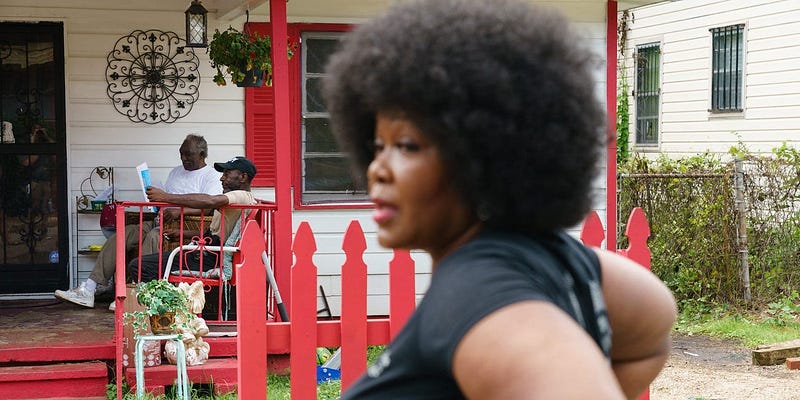Empowering Communities: How Four Black Women Boosted Vaccination Rates
Written on
Community Empowerment and Health Advocacy
In Alabama, one of the states with the lowest vaccination rates in the U.S., four Black women have made significant strides in addressing the challenges of misinformation and fear surrounding COVID-19 vaccines.
“People often have misconceptions that can prevent them from getting vaccinated,” noted one community advocate.
Among them is Dorothy Oliver, who has been actively engaging her community about the importance of vaccination. At her general store in Panola, Alabama, she has taken it upon herself to educate customers and encourage them to get vaccinated, often through personal calls.
“I’ve made countless phone calls to reach out to people,” Oliver explained. With a population of around 400 in Panola, she has worked tirelessly to ensure that nearly all residents have received their shots.
As of now, Alabama ranks 41st in vaccination rates, with only about 52% of the population fully vaccinated. In Sumter County, where Panola is located, the rate drops to 42%. The distance to the nearest vaccination site—about 35 miles—and the existing fears about the vaccine made it challenging for many residents to get vaccinated before Oliver's efforts began.
Oliver has been particularly concerned about the elderly, who often lack access to online resources yet are at a higher risk for severe COVID-19 illness. “It’s crucial to talk to these older individuals and dispel the misinformation they encounter,” she said.
Supporting her in this vital work is Drucilla Russ-Jackson, a Sumter County commissioner. Together, they have garnered assistance from state health officials and the National Guard to facilitate vaccinations in their area.
Their collective initiatives are highlighted in "The Panola Project," a short film by Rachael DeCruz and Jeremy S. Levine featured in The New Yorker.
Effective Communication Strategies
Oliver’s approach primarily revolves around engaging conversations and gentle persuasion. “You can’t approach them with aggression; it’s essential to calmly explain the importance of vaccination,” she told Insider.
Humor can also ease the tension, as Russ-Jackson has found. “I often joke, ‘I’d better get my dress ready for your funeral,’” she shared.
A common misconception exists that Black communities are the most hesitant regarding vaccines. However, a recent poll from Ipsos and Axios revealed that vaccine hesitancy is more pronounced among white conservatives.
Sheila Tyson, a commissioner in Jefferson County, has also taken on the role of vaccine advocate, reaching out to residents weekly. Her efforts encompass both low-income Black and white communities.
Tyson emphasizes that access to vaccines is as significant an issue as hesitancy itself. “In low-income Black neighborhoods, the vaccination rate is improving, but in white low-income areas, skepticism prevails,” she noted.
Tyson criticized the initial rollout of vaccines, which often overlooked communities of color. “I raised many concerns about how the distribution was handled,” she expressed.

Addressing Misinformation and Historical Context
Many residents have deep-seated fears rooted in historical medical injustices. Tyson often references stories like that of Henrietta Lacks and the Tuskegee Syphilis Study to provide context for these fears.
In Panola, Oliver has encountered young individuals expressing doubts about the vaccine's safety. “They feel like they are being used as test subjects,” she explained.
One resident, LaDenzel, articulated his fear, saying, “Miss Dorothy, I’m just scared.”
Building Trust Through Community Engagement
To counter vaccine hesitancy, Tyson sends volunteers to community events like food drives and job fairs, mirroring her longstanding efforts to register voters. Materia Johnson, a retired teacher, has heard a myriad of concerns from individuals hesitant to receive the vaccine.
“Young people seem to be the most resistant,” she remarked, sharing that misinformation spreads quickly among this demographic.
Johnson's approach involves asking individuals about their plans if they contract COVID-19, and she takes the time to address the flaws in any strategy that doesn’t include vaccination.
However, the emotional toll of this work can be taxing. “Convincing just one person to get vaccinated feels like a major victory,” she admitted.
The Power of Relationships in Health Outreach
Johnson's outreach is just one of many strategies employed to increase vaccination rates. Oliver has also developed a list of residents who have yet to respond and has personally visited their homes.
A successful tactic has been the use of prize drawings to incentivize vaccinations, funded in part by Russ-Jackson.
Lee McIntyre, a philosopher at Boston University, emphasizes that overcoming distrust requires long-standing community relationships rather than just providing information. “Doubt can be mitigated with facts, but trust requires ongoing engagement,” he stated.
Tyson shared that many people she speaks with do not trust mainstream news, yet when she presents them with reliable articles, they are more receptive to the information.
Oliver echoed this sentiment, noting her community's familiarity with her has facilitated her outreach efforts.
Despite the challenges, Tyson sees her work as part of a larger struggle. “I’ve had to fight for everything in my life; this is just another challenge I need to overcome,” she reflected.
If you have a story about the coronavirus pandemic to share, reach out to us at [email protected].